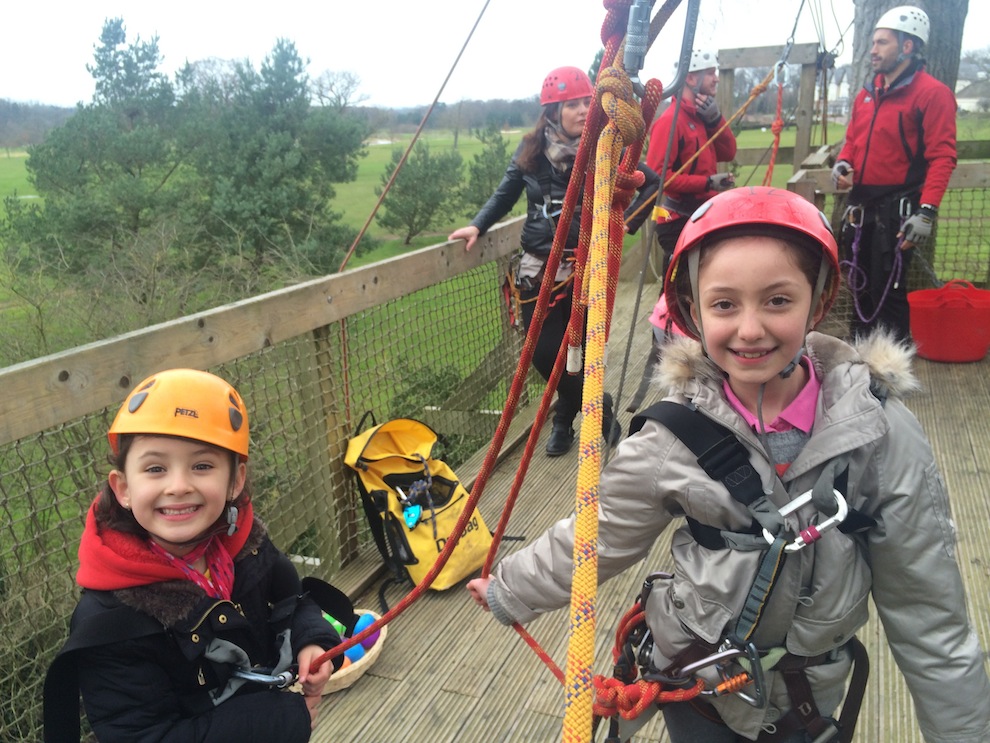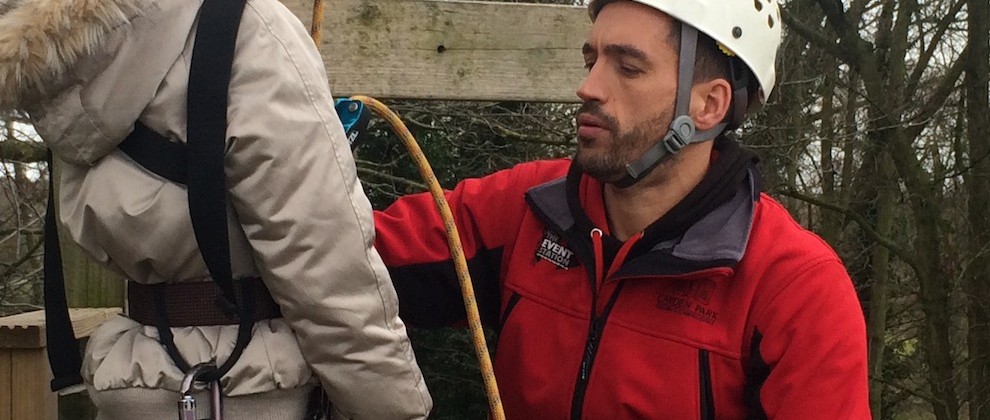It’s good to push yourself sometimes.
At least, that’s what I kept telling myself as I stepped gingerly off the platform and clung to the rope for dear life, my legs instantly contorting into a most ungraceful set of splits as I did so.
It was bad enough trying not to look down the 50ft-odd drop to the forest floor below but, with Maya and Olivia about to follow me out onto the aerial ropes course [pictured above], there could be no bottling it by dad.
“The first one is always the worst,” said instructor Phil, trying to sound reassuring. “It’s the fear of stepping into the abyss.”
Easter activities
We had come to Carden Park Hotel in Cheshire to try out some of the activities for the forthcoming Easter holidays. The hotel offers crazy golf and archery sessions, as well as boasting its own vineyard.
I had expected a gentle afternoon on the Easter Trail, searching for clues in the grounds to win chocolate eggs.
But the idea of leading my two daughters across a series of elevated platforms and obstacles caught me off guard.
We had harnesses and a full safety briefing, of course. But, despite the incentive of finding mini eggs along the course, did we have the nerve?
More to the point, as the responsible adult in charge of two primary-school-aged children more used to playing on the CBBC app than swinging like monkeys through an adventure playground, had I taken leave of my senses?
Active kids
Maybe not.
The National Trust report, Natural Childhood, suggests our children are exhibiting the symptoms of a modern phenomenon known as ‘Nature Deficit Disorder’ in regard to their lack of engagement with nature.
A key reason for this, it suggests, is the aversion of many parents to any form of risk. “No natural environment is completely free from risk,” writes report author Stephen Moss.
“But these risks are a fundamental part of childhood: by gradually learning what is safe and what is dangerous, especially with regard to their own actions and behaviours, children develop their own ‘risk thermostat’.”
The Council for Learning Outside the Classroom supports this view, expressing concern for the long-term implications for not allowing children and young people to experience risk, challenge and adventure.
The group promotes more creative approaches to curriculum development and summarises its concerns about risk aversion here.
Confidence building
From climbing nets to swinging logs, we made our tentative way across the course, instructor Phil [pictured below] lending a helping head to coax a nervous Maya across the high-wire stepping stones and swing a worried-looking Olivia across a gap too wide for little legs on her harness.
He was less forgiving of dad as I edged my way along an elevated log walkway and hesitated at a see-saw bridge. “Go on, attack it,” he advised, dismissing my request for emergency technique coaching.
“That’s not attacking it,” he laughed as the children looked on nervously.
He was right. I was never in the scouts and was probably more interested in my Space Lego than climbing trees when I was Maya’s age. But demonstrating my own nervousness will only hold the girls back in life.
There were some wobbles and a few tears along the course but, after an hour of white-knuckle antics, we were negotiating the wobbly bridges of the final obstacle.
“It’s always the parents who struggle,” smiled Phil, congratulating Olivia for being the youngest person in our group to make it across. “The little kids haven’t don’t have the fear.”
Down to the wire
By the time we reached the zip wire platform for the 250m descent back to terra firm, the girls were taking the course in their stride.
They raced each other on the zip wire [watch the vimeo] and laughed as I trundled behind, dangling like a limp balloon from my harness over a swampy bit of ground at the bottom.
Before I could even get myself free, Olivia was already devouring the first of several Easter eggs.
“Again,” she squealed as I headed for coffee and a long sit down.
I’m not booking a week at Center Parcs just yet but we had dared to step beyond our comfort zones.
And, once more, it took two young children to remind their sensible dad of a valuable life lesson: sometimes you just have to step into the abyss.
- Activities run from March 25 to April 10 at the hotel’s Event Station and are open to non-residents; prices and bookings here.
What did you think of this story? Post your comments below.
Liked this? Try also Family Cycling story wins at Holland Travel Awards.

